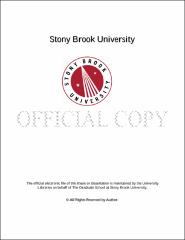| dc.identifier.uri | http://hdl.handle.net/11401/77795 | |
| dc.description.sponsorship | This work is sponsored by the Stony Brook University Graduate School in compliance with the requirements for completion of degree. | en_US |
| dc.format | Monograph | |
| dc.format.medium | Electronic Resource | en_US |
| dc.language.iso | en_US | |
| dc.publisher | The Graduate School, Stony Brook University: Stony Brook, NY. | |
| dc.type | Thesis | |
| dcterms.abstract | Estuarine organisms are experiencing many stressors related to climate change at an accelerated pace when compared to the open ocean. The co-occurrence of acidification and hypoxia has been observed during warmer months when many fish species spawn in temperate estuaries. Concurrently, estuarine systems can experience extreme temperatures during summer and dynamic levels of plankton. This study assessed the tolerance of early life stage estuarine fish to the co-occurrence of acidification with hypoxia, elevated temperatures, and varying levels of planktonic prey. Time to hatch, hatching rates, survival, and growth were quantified for larval <italic>Menidia beryllina</italic>, <italic>Menidia menidia</italic>, and <italic>Cyprinodon variegatus</italic> exposed from the egg through the larval stages to water with a low pH (7.4 versus 7.9, total scale) and dissolved oxygen concentration (2.5 mg L<super>-1</super> versus 9.0 mg L<super>-1</super>), while embryos of <italic>M. beryllina</italic> were also exposed to elevated temperatures and varying levels of prey. Hypoxia significantly delayed hatching of embryos by one to three days and reduced hatching success of all three species by 24 - 80%. Acidification and hypoxia had an additive negative effect on survival of <italic>M. beryllina</italic>, a synergistic negative effect on survival of <italic>M. menidia</italic> spawned in May but not June, and no effect on survival of <italic>C. variegatus</italic>. Acidification and hypoxia had an additive negative effect on length of larval <italic>M. beryllina</italic> while hypoxia alone significantly reduced length of <italic>M. menidia</italic> and <italic>C. variegatus</italic>, with reductions ranging from 15 - 45%. As abundant forage fish in estuaries along the Atlantic coast of the US, the tolerance of these three species to acidification and hypoxia may strongly influence the success of the coastal ecosystems and fisheries that depend on them as prey. Acidification and restricted food each significantly reduced survival (by 26% and 33%, respectively) and length (by 15% and 20%) of <italic>M. beryllina</italic>, and when combined they had an additive negative effect on survival and an antagonistic effect on length. Acidification and elevated temperature each significantly reduced survival (by 18% and 85%, respectively) of <italic>M. beryllina</italic> while the combined stressors had an antagonistic effect. This study contributes to the growing body of research that aims to predict how multiple climate change stressors will affect marine organisms and, in turn, ocean ecosystems. | |
| dcterms.available | 2017-09-20T16:53:36Z | |
| dcterms.contributor | Gobler, Christopher J | en_US |
| dcterms.contributor | Baumann, Hannes | en_US |
| dcterms.contributor | Nye, Janet. | en_US |
| dcterms.creator | DePasquale, Elizabeth | |
| dcterms.dateAccepted | 2017-09-20T16:53:36Z | |
| dcterms.dateSubmitted | 2017-09-20T16:53:36Z | |
| dcterms.description | Department of Marine and Atmospheric Science. | en_US |
| dcterms.extent | 59 pg. | en_US |
| dcterms.format | Application/PDF | en_US |
| dcterms.format | Monograph | |
| dcterms.identifier | http://hdl.handle.net/11401/77795 | |
| dcterms.issued | 2014-12-01 | |
| dcterms.language | en_US | |
| dcterms.provenance | Made available in DSpace on 2017-09-20T16:53:36Z (GMT). No. of bitstreams: 1
DePasquale_grad.sunysb_0771M_11790.pdf: 512944 bytes, checksum: 26210af72d2a291bd31fcf76dad66158 (MD5)
Previous issue date: 1 | en |
| dcterms.publisher | The Graduate School, Stony Brook University: Stony Brook, NY. | |
| dcterms.subject | Biological oceanography | |
| dcterms.subject | coastal acidification, forage fish, hypoxia, Menidia, ocean acidification, silverside | |
| dcterms.title | Effects of ocean acidification combined with hypoxia, elevated temperature, or restricted food supply on early life stages of the forage fish <italic>Menidia beryllina</italic>, <italic>Menidia menidia</italic>, and <italic>Cyprinodon variegatus</italic> | |
| dcterms.type | Thesis | |

